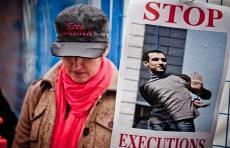“Down with Islamic tyranny in Iran” and “Freedom and Equality for Iran,” the signs read, carried by some 80 protesters who turned out on Jan 29 to condemn government-sanctioned executions and the use of capital punishment against Iran’s people, including its gay citizens.
Unsubstantiated reports allege that two gay men, both in their early 20s, were recently sentenced to death by stoning in Iran.
“By some media accounts, Ayub and Mosleh have been sentenced to death for raping a young man, filming their actions and inserting images of President Ahmadinejad into the film,” says a Jan 16 statement from the International Gay and Lesbian Human Rights Commission (IGLHRC).
IGLHRC says it hasn’t been able to confirm the allegations.
Reports indicated that the two were to be stoned on Jan 21, but there has been no confirmation if the stoning took place.
“This case is evidence, however, of much bigger problems in Iran: widespread abuse in the justice system and censorship of information,” the IGLHRC further states.
“People, including those who are lesbian, gay, bisexual or transgender may be arbitrarily arrested, tortured and convicted on baseless charges,” it reads. “It can be difficult, if not impossible, to know the facts that lie behind convictions.”
Despite the murkiness of the information about the two men, rally speakers still demanded an end to persecution against gays.
“Enough is enough,” one protestor shouted.
“You cannot stone us to death because we are homosexual.”
Yasi Baiani of Iran Solidarity Vancouver, which organized the rally outside the Vancouver Art Gallery, could shed no light on the fate of the two men.
“We have not heard any news about their execution, so we’re hoping that they’re still alive,” Baiani says.
“We will hear it because the families are going to say,” she adds.
“There is the International Committee against Stoning, and they’re the ones that got the news from Iran. They’re a well-known organization, and people from Iran usually contact them, and we heard it from them; they are based in Europe,” Baiani elaborates.
Xtra‘s attempts to reach the committee were unsuccessful before posting time.
Most of the time gay men are executed for rape in Iran, Baiani says.
On the first two occasions a person is found to have had same-sex relations, the punishment is flogging, she says.
“The third time is punished by death penalty, both for gay and lesbian sex. It is clearly indicated in the Islamic codes of Iranian laws.”
Under a constant, sometimes heavy drizzle, the Vancouver rally is one of more than 30 that occurred worldwide on Jan 29 to protest Iranian government actions, even as thousands take to the streets of Cairo and other Egyptian cities in what is being labelled a new era in the Middle East.
Several speakers invoked scenes of average people standing up to Egyptian police and beleaguered president Hosni Mubarak, as well as the recent flight of Tunisia’s Ben Ali, as signs that a popular backlash is unfolding in the region. They hope the sentiment will eventually sweep into Iran.
In a Jan 31 email to gay journalist Rex Wockner, Scott Long, a senior fellow at the Center for Gender and Sexuality Law at Columbia University, says there are gays and lesbians in the Egyptian demonstrations, though they’re not marching under a rainbow flag.
“All identities seem subsumed at the moment under the first flush of being free Egyptians, but marching together as friends and supporting each other,” he writes.
Chris Morrissey, of the advocacy group Rainbow Refugee Committee, says it’s important for gay people to support the protest work of other activists.
“I think it’s necessary for us to be here, as queers who work for protection of lesbian, gay, transgender, bisexual people, to be here to bring some visibility,” Morrissey says.
“The organizers clearly mentioned different groups of people, including people who are being persecuted and executed because of their sexual orientation, and I think it’s critical for us to stand with others as well, so we’re not all splintered off doing our own thing.”


 Why you can trust Xtra
Why you can trust Xtra


